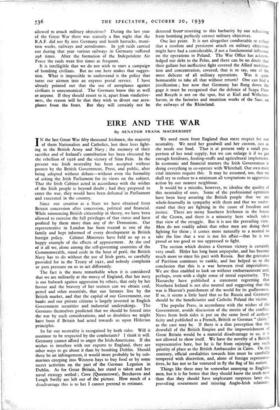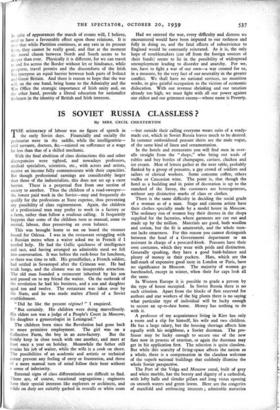EIRE AND THE WAR
By SENATOR FRANK MACDERMOT
IN the last Great War fifty thousand Irishmen, the majority of them Nationalists and Catholics, lost their lives fight- ing in the British Army and Navy ; the memory of their sacrifice and of Ireland's contribution has been obscured by the rebellion of 1916 and the victory of Sinn Fein. In the present war Irish neutrality has been accepted without protest by the British Government, Press, and public, after being adopted without debate—without even the formality of asking the Irish Parliament for its views on the subject. That the Irish Cabinet acted in accordance with the wishes of the Irish people is beyond doubt ; had they proposed to enter the war, they would have been defeated in Parliament and execrated in the country.
Since our creation as a State we have obtained from Britain concession after concession, political and financial.
While renouncing British citizenship in theory, we have been allowed to exercise the full privileges of that status and have profited by them more than any of the Dominions. Our representative in London has been treated as one of the family and kept informed of every development in British foreign policy. Cabinet Ministers have held us up as a happy example of the effects of appeasement. At the end of it all we, alone among the self-governing countries of the Commonwealth, stand aside in the hour of peril, the British Navy has to do without the use of Irish ports, so carefully provided for in the Treaty of 1921, and nobody complains or puts pressure on us to act differently.
The fact is the more remarkable when it is considered that we are militarily at the mercy of England, that her navy is our bulwark against aggression by others, that only by her favour and the bravery of her seamen can we obtain coal, petrol and other essentials, that our farmers live by the British market, and that the capital of our Government, our banks and our private citizens is largely invested in English Government securities and industrial undertakings. The Germans themselves predicted that we should be forced into the war by such considerations, and so doubtless we might have been if Britain had acted towards us upon Hitkrian principles.
So far our neutrality is recognised by both sides. Will it continue to be respected by the combatants? I think it will.
Germany cannot afford to anger the Irish-Americans. If she wishes to interfere with our exports to England, there are other ways to go about it than by bombing Dublin. Should there be an infringement, it would more probably be by sub- marines creeping into Western bays to buy food or by some secret activities on the part of the German Legation in Dublin. As for Great Britain, her stand is taken and her naval strategy settled ; Cove (Queenstown), Berehaven and Lough Swilly are left out of the picture. How much of a disadvantage this is to her I cannot pretend to estimate. We need more from England than mere respect for our neutrality. We need her goodwill and her custom, just as she needs our food. That is at present only a small pro- portion of her total supply, but we can enlarge it if we get enough fertilisers, feeding-stuffs and agricultural implements. In economic and financial matters the Irish Government is doing everything to co-operate with Whitehall. Our own most vital interests require this. It may be assumed, too, that we shall try to reduce to a minimum all temptations to aggressive action by our nearest neighbour.
It would be a mistake, however, to idealise the quality of this neutrality of ours. Some of the professional optimists have been busy assuring the British people that we are whole-heartedly in sympathy with them and that we under- stand that they are fighting in the cause of freedom and justice. There are many Southern Irishmen in the forces of the Crown, and there is a minority here which takes that view of the struggle. But it is not the prevailing view. Men do not readily admit that other men are doing their fighting for them ; it comes more naturally to a neutral to take the line that a war is not his affair—that he is too proud or too good or too oppressed to fight.
The section which desires a German victory is certainly very small. Hitler has long been unpopular, and has become much more so since his pact with Russia. But the grievance of Partition continues to rankle, and has helped us to the conclusion that this is a war between rival imperialisms. We are thus enabled to look on without embarrassment and, perhaps, even with a slight sense of moral superiority. The Hierarchy have published a statement regretting that Northern Ireland is not also neutral and suggesting that the war is Heaven's punishment of the world for its godlessness. If so, it seems a little hard that so far Russia and Germany should be the beneficiaries and Catholic Poland the victim.
The popular Press, in accordance with the wishes of the Government, avoids discussion of the merits of the conflict. News from both sides is put on the same level of authen- ticity and published as a French, British or German "claim," as the case may be. If there is a dim perception that the downfall of the British Empire and the impoverishment of Great Britain would be a material disadvantage to us, it is not allowed to show itself. We have the novelty of a British representative here, but he is far from enjoying any such priority of place as the British Ambassador in Cairo. On the contrary, official cordialities towards him must be carefully tempered with discretion, and, alone of foreign representa- tives, he has not so far ventured to fly the flag of his nation.
Things like these may be somewhat annoying to English- men, but it is far better that they should know the truth now than that they should have unpleasant surprises later on, provoking resentment and injuring Anglo-Irish relations. Ir. ,pite of appearances the march of events will, I believe, ter d to have a favourable effect upon those relations. It is tre that while Partition continues, at any rate in its present fe:in, they cannot be really good, and that at the moment moral chasm between North and South seems to be ch:Ter than ever. Physically it is different, for we can travel w and fro across the Border without let or hindrance, while pa,sports, travel permits and the discomforts of the Irish Si interpose an equal barrier between both parts of Ireland and Great Britain. And there is reason to hope that the war will. on the one hand, bring home to the Admiralty and the War Office the strategic importance of Irish unity and, on the other .hand, provide a liberal education for nationalist Irishmen in the identity of British and Irish interests. Had we entered the war, every difficulty and distress we encountered would have been imputed to our rashness and folly in doing so, and the fatal effects of subservience to England would be constantly reiterated. As it is, the only hope of troublemakers (cut off from the foreign sources of their funds) seems to lie in the possibility of widespread unemployment leading to disorder and anarchy. For we, too, have to fight a war of our own—a war created for us, in a measure, by the very fact of our neutrality in the greater conflict. We shall have no national services, no munition works, to give gainful occupation to the victims of economic dislocation. With our revenue shrinking and our taxation already too high, we must fight with all our power against our oldest and our grimmest enemy—whose name is Poverty.













































 Previous page
Previous page